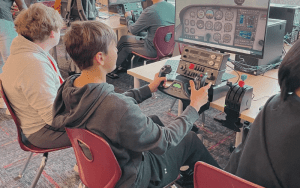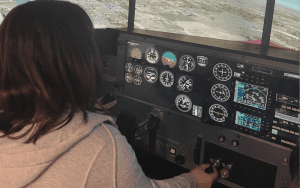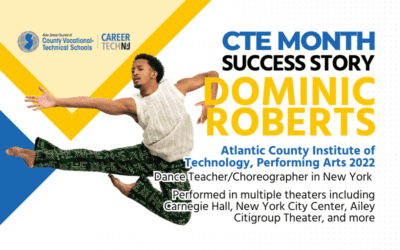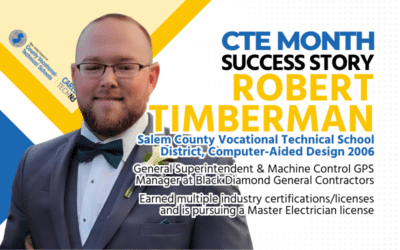
Atlantic County Institute of Technology students have access to desktop simulators to support their learning in the high school’s aviation studies program.
Opportunities in aviation are broad, extending well beyond flying planes. Atlantic County Institute of Technology has relied on partnerships to ensure county youth are aware of these opportunities — especially those right in their backyard — and how they can pursue them as early as freshman year of high school.
“We have a strong relationship with the Atlantic County Economic Alliance and have worked to support the county’s focus on growing the aviation industry in our area,” said Karen Arcidiacono, director of curriculum, instruction and special projects for ACIT.
“When diversifying an economy like we are in Atlantic County, having the right partners makes all the difference,” said Lauren Moore, president of the Atlantic County Economic Alliance. “Our excellent relationship with ACIT, and with other important partners like Atlantic Cape Community College and the Atlantic County Workforce Development Board, gives us the opportunity to show our communities the exciting and fulfilling careers that are available to them in new sectors like aviation, right here at home. Plus, having a trained and ready workforce is critical in attracting new businesses to the region. Everyone wins.”
ACIT’s four-year, full-time aviation studies program continues to expand with funding awarded through the 2018 Securing Our Children’s Future Bond Act. The expansion project includes the addition of a focused career program in aviation maintenance, which will be housed in a new building with an airplane hangar where students can practice their new skills.
The investment in ACIT’s aviation studies program demonstrates a key strength of New Jersey’s county vocational-technical schools to support both local and state economies. The schools’ focused programs help build a pipeline of engaged and well-trained professionals in areas with identified needs and opportunities for growth.
“Our aviation studies curriculum introduces students to roles beyond being a pilot or working in maintenance to also include research, airport management, air traffic control, engineering and drone operation, among other things,” added Arcidiacono.
Much of the students’ career exploration and training is supported by local industry. Juniors and seniors take classes every other day at the National Aerospace Research and Technology Park, where both NASA and the Federal Aviation Administration have offices and spearhead many of the research projects underway.
Through field trips and a monthly mentorship program, students also connect with the engineers at the FAA William J. Hughes Technical Center, located at the Atlantic City International Airport. The airport is deemed a “smart airport,” because of the ongoing research and testing occurring onsite. This also opens the door for students to learn from the professionals there and engage in workplace learning in a range of aviation-related roles.
ACIT aviation instructor Andrew Nebl is an active member of the state’s Aviation Education Council. He said that, through that organization and his contacts with employers and organizations, he continues to seek new opportunities for his students to learn outside of the classroom.
“I welcome industry partnerships to help energize my students through field trips, guest speakers and work-based learning placements,” Nebl said. “I hope each of these experiences helps them connect what they have been learning over the past few years to real-world application and makes them excited to continue pursuing a career in the aviation industry.”
A retired military pilot for both the Army and Coast Guard, Nebl said his main goal is to help students build a foundation for future success.
“I teach leadership, how to analyze information, effective communication, reading and writing, research skills — all through the implication of aviation content and skills,” he explained.
Nebl also gets to share his own experiences as a pilot. He teaches a course in ground instruction, which puts students on the path toward earning a private pilot license. Also included in the instruction is the FAA exam — at no added cost to students.
“I currently have eight students flying,” said Nebl. “I get them started, and then they finish up the requirements on their own.”
A partnership with Embry-Riddle Aeronautical University affords ACIT aviation students yet another head start toward their future goals. Many of Nebl’s courses follow the Embry-Riddle curriculum, which means his students can graduate with 18-20 transferable college credits.
“We’re the only high school program in the state to partner with Embry-Riddle,” said Arcidiacono. “The credits students earn start them down a pathway to further their studies at an accepting university.”

Alyvia Valentin, an aspiring astronaut, practices flying on Atlantic County Institute of Technology’s full motional Redbird simulator as part of her aviation studies coursework at the high school.
Alyvia Valentin, a junior in the aviation studies program, said the college credits and the course for her private pilot license move her closer to her ultimate career goal of becoming an astronaut.
“This program has solidified the fact that I want to do this in my life,” she said. “I know I want to go to college and either major in astrophysics or physics, complete the steps to earn a pilot license, go to graduate school to earn a Ph.D. and then apply to work for a space agency.”
Valentin said she first aspired to be an astronaut in the fourth grade when she studied the solar system. When she learned that she could focus on aviation in high school, she applied to ACIT without hesitation.
“I’ve learned more than I could have imagined here,” she said. “We have covered the mechanics and the physics of flying, and we even looked at how to prepare for flight, including how to read a weather map.”
Now, Valentin said, she appreciates venturing into other areas like drone operation and computer aided drafting and design, which have provided her with additional opportunities to earn certifications and broaden her knowledge base.
“With the CADD class, I’ll earn a Fusion 360 certification, which I know will be valuable as more and more employers — even NASA — want to hire people with technology skills,” she said.
Arcidiacono said the next adjustments to the aviation studies program will include even more of a focus on new and emerging technology. Her colleague, Jamie Burrows, supervisor of career and technical education, emphasized that having representatives from industry on the program’s advisory board help keep the curriculum relevant.
“We welcome anyone from industry who is interested in supporting our program and our students to get involved,” Burrows said. “There are many ways to partner with us, and there is always a seat at the table.”
Conversation Starter
Interested business partners can contact Karen Arcidiacono at 609-625-2249, ext. 1025, or karcidiacono@acitech.org, or Jamie Burrows at ext. 1026, or jburrows@acitech.org.
This article originally appeared Oct. 3, 2023 in ROI-NJ.



